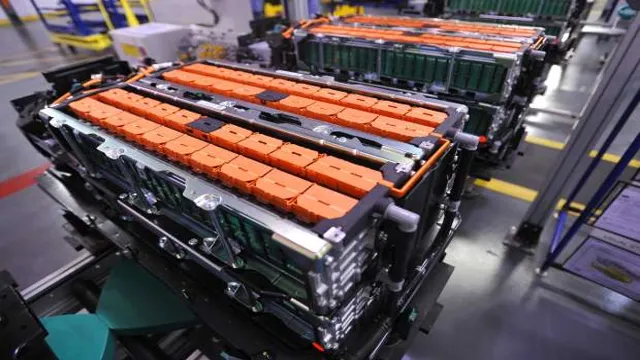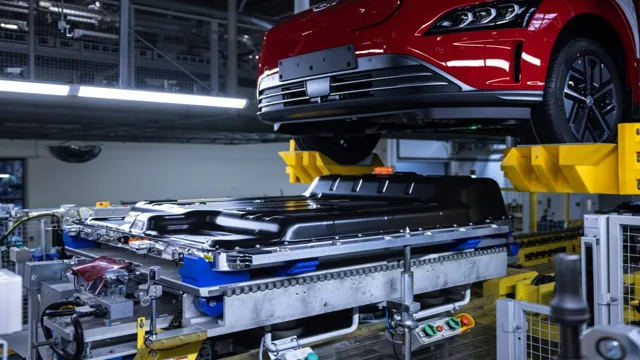Revolutionizing Transportation: The Rise of Electric Car Battery Plants
We’re moving towards a future where electric cars will rule the roads. But, have you ever wondered where their power will come from? In this blog post, we’ll explore the importance of electric car battery plants in powering the future. These plants play a critical role in producing the batteries required to power electric vehicles.
Like the heart of an electric car, these plants keep the vehicle running. The batteries need to be reliable, long-lasting, and capable of producing enough power to keep the car running for hundreds of miles. Electric car battery plants are the key to ensuring that electric vehicles will be a viable and sustainable option for transportation in the future.
The benefits of electric cars are numerous, from reducing greenhouse gas emissions to saving money on gas. However, the production of electric car batteries requires a significant amount of resources and energy. Therefore, as we move towards electric vehicles, it is essential to acknowledge the role of electric car battery plants in the transition.
So, buckle up and join us on this journey as we dive into the world of electric car battery plants and discover how they are powering the future.
The Rise of Electric Cars
With the rise of electric cars, the demand for electric car battery plants has greatly increased. Electric car manufacturers are working hard to keep up with the growing demand for electric vehicles, and to do so, they need to produce more batteries. That’s why many car companies have started investing in electric car battery plants around the world.
These plants help manufacturers produce more batteries so they can keep up with the demand for electric cars. With the rise of electric cars, we are seeing a shift in the automobile industry. As more electric cars hit the road, we can expect to see more investment in electric car battery plants, which will lead to the production of more electric vehicles and a more sustainable future.
Exploring the Growing Market for Electric Vehicles
Electric Vehicles Electric cars are the future of transportation. The market for electric vehicles is experiencing steady growth as more consumers become environmentally conscious and choose to switch to electric cars. With the advancement of technology and the increase in production, electric cars are becoming more affordable and accessible to a wider range of people.
Although the initial investment may be higher than that of a traditional gasoline-powered car, the long-term benefits, such as reduced fuel costs and tax incentives, make it a worthwhile investment. Additionally, electric cars are more efficient and emit fewer greenhouse gases, making them an eco-friendly choice for those who want to minimize their carbon footprint. As battery technology continues to improve, electric cars will become more practical, and the range between charges will increase.
The future of the automobile industry is electric, and in the years to come, it will be fascinating to see how this market grows and evolves.

The Push for Sustainability and Renewable Energy
One of the biggest pushes for sustainability and renewable energy in recent years has been the rise of electric cars. These vehicles are powered by electric motors instead of traditional combustion engines, making them much cleaner and more efficient than their gas-guzzling counterparts. Not only do electric cars emit significantly less harmful pollutants into the air, but they also cost less to operate and maintain than traditional cars.
With advancements in battery technology and charging infrastructure, electric cars are becoming more practical and convenient for everyday use. Plus, driving an electric car can feel like driving a spaceship – they are incredibly quiet and offer instant acceleration. As more and more countries and companies commit to reducing their carbon footprint, the demand for electric cars is only set to grow in the coming years.
The Importance of Battery Technology
Electric car battery plants are becoming increasingly important in our world today. With the growing demand for electric cars, the need for efficient and reliable batteries has become more crucial than ever before. Battery technology has been developing rapidly, resulting in the production of more efficient and powerful batteries that can sustain long travel distances.
The emergence of electric car battery plants has played a major role in driving this growth, as they are specifically designed to produce high-quality batteries for electric cars. These plants use cutting-edge technology and automated processes for battery production, leading to faster and more cost-effective manufacturing. As the demand for electric cars continues to grow, the importance of these plants will only increase.
They are the backbone of the electric car market, and the quality of their batteries will ultimately determine the success of this industry.
Breaking Down the Components of an Electric Car Battery
The importance of battery technology cannot be overstated in the world of electric vehicles. The battery is one of the most critical components of an electric car, and its performance can make a significant difference in the car’s overall efficiency and range. A typical electric car battery pack contains hundreds of individual battery cells that work in unison to deliver the power necessary to drive the car’s electric motor.
These battery cells are typically made from one of two types of lithium-ion chemistries, which offer a high energy density, good cycle life, and a relatively low risk of fire or explosion. In addition to the battery cells, the battery pack also includes electronic systems for monitoring the cells’ performance, cooling systems to keep the cells within a safe operating range, and protective measures to prevent the battery from overcharging or discharging too quickly. As electric vehicles become more popular, battery technology will continue to evolve and improve, leading to longer ranges, faster charging times, and lower costs.
The Race for Innovation: Advances in Battery Technology
Battery technology is becoming increasingly important as we look for sustainable solutions to power our homes, businesses, and transportation. Advances in battery technology have the potential to revolutionize our daily lives by increasing efficiency and decreasing our dependence on fossil fuels. With the race for innovation in full swing, companies are competing to find the next big breakthrough in battery technology that will make renewable energy sources even more accessible and affordable.
The need for durable, affordable, and efficient batteries has never been greater, and the potential applications are endless – from electric vehicles to grid-scale storage solutions. As the storage capabilities of batteries improve, it will allow us to harness more clean energy from sources such as wind and solar power. The success of this race could be the key to unlocking the full potential of renewable energy and transforming the way we power our world for generations to come.
The Environmental Impact of Battery Production and Disposal
Battery technology is quickly becoming one of the most important advancements in the modern world, providing power to everything from our cell phones to electric vehicles. However, as with any new technology, there are environmental impacts that need to be considered. The production of batteries requires a significant amount of energy and resources, including the mining of raw materials, such as lithium, cobalt, and nickel.
This process can lead to land degradation, water pollution, and deforestation. Additionally, the disposal of batteries can also have harmful effects on the environment, with toxic chemicals seeping into soil and water sources. Despite these challenges, it’s important to recognize the outstanding benefits that battery technology can provide, such as reducing greenhouse gas emissions and improving energy efficiency.
As we continue to develop new battery technologies, it’s crucial that we also prioritize sustainability and take steps to minimize any adverse environmental impacts.
Leading Electric Car Battery Plants
Electric car battery plants are becoming increasingly important in the automotive industry as more and more car manufacturers are switching to electric vehicles. One of the leading electric car battery plants is Gigafactory 1, owned by Tesla and located in Nevada, USA. This factory has the largest footprint of any building in the world and produces Tesla’s batteries, motors, and energy storage products.
Another notable plant is the LG Chem factory in Poland, which supplies batteries to major car manufacturers such as Audi, GM, and Hyundai. It is one of the largest lithium-ion battery factories in Europe and has a production capacity of over 100,000 batteries per year. Lastly, there is CATL, or Contemporary Amperex Technology Co.
Limited, based in China and the largest lithium-ion battery manufacturer for electric vehicles in the world. CATL supplies batteries for Volkswagen, Toyota, and BMW, and has plans to build a factory in Germany to serve the European market. As the demand for electric cars continues to grow, these battery plants will play a crucial role in meeting the needs of the automotive industry.
Tesla’s Gigafactory: A Gamechanger in Battery Production
Tesla’s Gigafactory in Nevada is a revolutionary facility that produces electric car batteries and has significantly transformed the industry. The factory is enormous, covering 5 million square feet, and is equipped with cutting-edge technology that enables it to produce efficient and high-quality batteries at a low cost.
Tesla’s Gigafactory has a production capacity of 35 GWh per year, which is enough to power 500,000 electric cars. This means that Tesla can produce its own batteries, reducing external production costs, and enabling the company to make electric cars that are affordable to the masses. Additionally, the Gigafactory is powered by renewable energy sources, such as solar power, reducing the plant’s carbon footprint.
The Gigafactory has become a gamechanger for the electric car industry by providing a sustainable solution for battery production that is both cost-effective and efficient.
LG Chem: A Major Player in the EV Battery Market
As electric cars continue to grow in popularity, so does the demand for efficient and reliable batteries. LG Chem has become a major player in the EV battery market with its leading electric car battery plants. These plants produce batteries for various major car manufacturers, including General Motors and Tesla.
LG Chem is known for its high-quality batteries that offer both long range and fast charging times. The company has also been investing heavily in research and development to improve its batteries even further. With a growing global demand for electric cars, it’s clear that LG Chem’s presence in the EV battery market will only continue to grow.
Investing in the Future of Electric Cars
Investing in the future of electric cars means investing in electric car battery plants. Without efficient and reliable batteries, electric cars are not a practical or feasible option for the average consumer. However, as more and more automakers invest in battery plants, the cost of electric cars will decrease, making them more accessible to the average driver.
These batteries are not only crucial for personal transportation, but also for the future of sustainable energy and combating climate change. Additionally, the growth of electric car battery plants creates job opportunities and boosts local economies. By investing in these plants now, we are not only investing in the future of transportation, but also in the future of our planet.
Conclusion
In conclusion, electric car battery plants are not just places where batteries are manufactured, they are the spark that ignites a revolution towards a sustainable future. With their advanced technologies and efficient processes, these plants are at the forefront of the electric vehicle industry, bringing us closer to a world powered by clean, renewable energy sources. So if you’re looking for a bright and electrifying future, look no further than the battery plant, where innovation and sustainability go hand-in-hand.
“
FAQs
What is the significance of electric car battery plants in the automotive industry?
Electric car battery plants are significant in the automotive industry as they produce the batteries that power electric vehicles and contribute towards reducing greenhouse gas emissions.
Are there any new technologies being developed for electric car battery plants?
Yes, new technologies such as solid-state batteries and lithium-air batteries are currently being developed in electric car battery plants to increase battery performance and reduce costs.
How do electric car battery plants ensure the sustainability of their battery production process?
Electric car battery plants ensure sustainability by implementing recycling programs to recycle old batteries, using renewable energy sources for production, and reducing the use of non-renewable resources in their supply chain.
What are the challenges faced by electric car battery plants in meeting the demand for electric vehicle batteries?
Electric car battery plants face challenges such as the availability of raw materials, capacity limitations, and increasing competition from other battery manufacturers.





